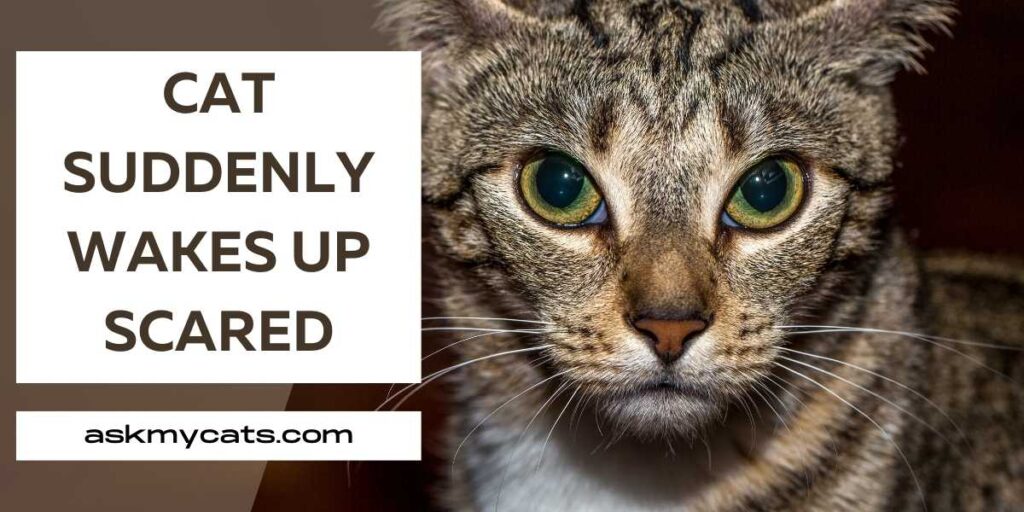Don’t be deceived by your sleeping cat. You may have observed that she is there with her eyes closed one second and then near to the fridge the next.
This begs the question, “How did she achieve that?”
Cats, in actuality, do not sleep for 16 hours continuously; rather, they alternate sleep and rest.
But let us find out more about cats and their sleeping patterns and why our feline friend awakens violently.


Give Your Cat the Perfect Day
Get the Free Ebook!
Cat Wakes Up Screaming?
Meow! This beautiful greeting is a nice salutation during the day. But at 4:30 a.m., it’s a blaring, demanding alarm clock.
We understand your irritation if your cat wants attention and expresses it by meowing or resting on your head when you’d rather be asleep.
If your cat meows as she wakes up, they might have been in deep sleep or possibly experiencing a nightmare.
According to veterinary neurologist Adrian Morrison, if a cat is in REM sleep, it may lift its head as though they are viewing something, so the next time your cat meows as they wake up, check its reactions and don’t jump to quick conclusions.
According to research, cats may dream about recent events, and they may even have nightmares, albeit we don’t know how severe such dreams are.
Your cat may twitch, stretch, snort, or make squeaky noises when sleeping. These types of behaviors are typically triggered by impulses in your cat’s brain that occur throughout the dream.
If your cat has experienced a terrifying incident, such as being pursued by a dog, it may be dreaming about it and waking up scared.
Why Does My Cat Wake Up Startled?

Cats have a reputation for being infamous nappers. They appear to spend most of their time sleeping, either snuggled up on our laps or concealed in their favorite secret spot.
It may surprise you to find that cats sleep twice as much as humans and spend an average of 15 hours each day sleeping, but for severely exhausted cats, this may easily be up to 24 hours, so it is only human to get struck by the fact that they wake up with a startle as if being scared or chased by something,
Night terrors might be waking up your cat. Other reactions to sounds, for example, dread of interior or outside critters, should be observed.
If your cat’s health is generally good, you can help them receive the rest they require, with a veterinarian consult to assure good sleep with drugs if needed.
They need to feel well quickly as sleep is an important aspect of cats’ life therefore treating their symptoms is acceptable as long as we leave nothing to chance in determining the reason.
Your cat may be having trouble sleeping as we talked about before, but we don’t want tunnel vision. Their horror when they were jolted up from a deep slumber indicates that their brain is reacting with tremendous emotion, but the true problem may be somewhere in their body.
Aside from dreams of previous hunting experiences, there might be a medical cause why our furry buddy wakes up with a startle.
Pain can originate from practically any source. Allergic cats may be shocked by a severe itch. They can dart from the room as if shot from a cannon, whether they are completely sleeping or simply sitting peacefully.
An arthritic joint or an intestinal tightness may be jolting your cat out of an otherwise peaceful cat slumber. This is not tranquil; they require safety.
Why Does My Cat Suddenly Wake Up And Meow?

If you often observe your sleeping cat, you may notice that they occasionally twitch their whiskers, flicks their paws, and may even begin to kick and stir without appearing to wake up.
In rare cases, your cat may produce little noises or even wake you up meowing. While this may appear strange at first, there are several reasonable explanations for this behavior.
However, there are times when odd meowing may suggest that something is amiss and your cat needs veterinary attention.
“Why does my cat wake up meowing?” you may be thinking. May he experience nightmares?”
There are various indications you can look for to assist you in better grasping what’s going on and detecting a problem. There are various indicators you may look for to assist you to comprehend what’s going on and detecting an issue.
While scientists are still trying to figure out what occurs while cats sleep, they have a solid sense of what’s going on.
Cats create nighttime sounds for a variety of reasons. According to Catster, your cat may meow or shout at you if they are bored, hungry, or uneasy in a new situation. Lonely cats may seek you out at night and attempt to rouse you awake.
Medical issues can sometimes cause cats to meow and vocalize at night. A cat who has recently moved to a new home may whine out of nervousness. Meowing due to bewilderment is common in cats suffering from dementia.
Why Does My Cat Get Scared While Sleeping?

Cats have distinct sleep-wake cycles than other animals, and they are frequently active at night. This is due to the fact that cats are crepuscular, meaning they hunt and are active in the evening or early morning.
The REM sleep cycle lasts for longer and also deepens their dreaming, as a part of this dreaming phase of the sleeping cycle they tend to get nightmares/ night terrors, some animal abuse they had to suffer at the pet store or in the wild, or remembering their past experiences of hunting.
All of these factors contribute to a cat’s reaction of flickering their mustaches, twitching, moving their legs, or even waking up scared and meowing.
This nighttime cat behavior is commonly referred to as the night crazy, and it can cause cat owners to lose sleep. There are things you can do to assist if your cat won’t let you sleep.
Nighttime Cat Behavior Signs
Your cat may exhibit several activities that keep you up at night. These actions, which may begin in the evening or awaken you in the middle of the night, include:
1. Exciting, wild play across you or your furnishings
2. While sleeping, wiggle your toes
3. Pushing into your ears when you sleep
4. Weeping or yowling
Nocturnal Cat Behavior Causes
Cats are sometimes more active at night or early in the morning. This is mainly due to your cat’s natural need to hunt and travel during these seasons.
However, there may be additional reasons that contribute to cats’ excessive nocturnal activity, such as:
Being alone at home. You are permitted to keep your cat at home alone throughout the day while you are at work or school. Your cat may spend most of the day resting or relaxing during this period. All of that slumber throughout the day might result in a hyperactive cat at night.
Boredom. If your cat spends most of the day alone, he or she may become bored and need more companionship and attention. Cats are sociable animals, and your cat may be waking you up for attention. This may be considered social play for your cat.
Hunger. Cats frequently wake up throughout the night to feed, which corresponds to their natural tendency to hunt during the twilight hours.
Old age. Sleeping habits in cats frequently change as they mature. You may notice that your cat is more active at night, which might be due to health issues or the natural aging process.
Health problems. Certain medical issues might make your cat hyperactive, uncomfortable, noisy, and needy at night.
These are some examples:
1. Pain
2. Anxiety
3. Hyperthyroidism
4. Chronic illness
5. Dementia that causes problems with :
a) Sleep disturbances
b) Poor memory
c) Neediness
Your cat may normally be more active at night, but if their nocturnal activity suddenly changes and becomes more extreme, consult your veterinarian to rule out a health condition.
Why Your Cat Won’t Let You Sleep at Night?
Cats frequently appear to be out of rhythm with our wake/sleep cycles, and this is true.
Humans are diurnal by nature, which means we are up throughout the day and sleep at night.
You would imagine that cats are only active at night, but this is not the case. Crepuscular cats are those who sleep at night.
Crepuscular animals are most active in the late evenings and early mornings, so they are winding up just as we are. This is the most popular period for cats to play, hunt, and engage in other fundamental activities.
In the wild, this is also when many of their prey species (such as rodents) awaken and begin to move around, making it an ideal time for a predator (such as your cat) to be awake and hunting.
Many tamed cats still exhibit these tendencies. Cats will typically sleep 18 hours a day, stretched out over a series of 78-minute naps.
They sleep during the day and at night, only to wake up and become active soon before we go to bed, and again shortly before we want to get up. This may be a major confrontation!
So, how can you get your cat on a more compatible schedule so you can sleep?
What To Do For The Silent Sleep Of Your Cat At Night?
Just as some people are night owls and others are early risers, most cats have fairly consistent sleep/wake cycles. It is not always feasible to persuade people to change their ways. However, if your cat is waking you up at night, there are several things you may do.
NOTE: An elderly cat who is restless and howls at night is an essential exception to these rules. There are a variety of medical problems that might cause elderly cats to appear “needy” at night. Typically, these cats have a history of being well-behaved before abruptly pacing at night, wailing, and appearing nervous. If this is the case, take your cat to the vet as soon as possible for an assessment and bloodwork to rule out any underlying illnesses.
Otherwise, here are some strategies you might want to use.
Try keeping your cat awake for extended periods.
The simplest way is to prevent your cat from taking those late-afternoon naps. If you can keep your cat awake for much of the evening, they may be exhausted enough to sleep when you go to bed.
Playing activities with your cat, such as capturing the laser pointer dot, fetch, and feather teasers will help tire out eager kitties. The longer you can keep your cat up, the more probable it is that they will “crash” and sleep when you do.
Keep your cat occupied while you’re away.
These play sessions also address another typical reason cats keep you up at night: boredom and loneliness.
If your cat is left alone at home all day while you are at work, he or she may be eager to spend time with you in the evening. Unfortunately, this may interfere with your bedtime routine.
Keeping them up and interested throughout the day while you’re gone may aid with their sleep at night.
Here are a few techniques to try:
1. Turning on the television for your cat to watch (try nature shows)
2. Feed your cat using a puzzle toy rather than a dish, so that your cat has to work for their food.
3. Setting smart bowls to open at certain times to dispense treats ( if feasible )
Food and treats may be used as motivators to keep cats occupied and amused, but be careful not to overfeed or over-treat your cat. Over the period of 24 hours, divide a healthy quantity advised by your veterinarian.
Because canned food has fewer calories per volume than dry food, utilizing canned food for the majority of your meals may help balance out any dry food you provide in puzzle toys or as rewards.
At bedtime, give your cat a tiny supper.
Cats, like us, tend to go asleep after eating, so feeding a little food immediately before night may encourage your cat to eat and sleep.
If your cat loves to wake you up for food, especially in the early morning hours, consider programming a smart bowl (automated pet food feeder) to deliver food at that time.
Create separate sleeping areas.
If none of the previous suggestions have worked, you may need to take charge of your area and shut the door.
You may also create a comfy “cat area” where your cat can sleep but not bother you. This might be as basic as providing a room with food, drink, toys, and a litter box.
Avoid responding to requests unless essential.
If this is not the case, and your cat just wants you to get up (for example, to play or bring food), and you respond by getting up solely to get them to leave you alone, your cat has now taught you to respond rather than the other way around.
It becomes a game to push away a kitten that is pouncing on you. Getting up at 4 a.m. on a Saturday to feed your cat because you want to sleep in teaches them that if they pester long enough, they will get what they want.
Ignore the behavior completely and take efforts the next night to avoid it from happening in the first place, no matter how difficult it is. If your cat is older and suddenly becomes more demanding at night, take them to the vet instead of ignoring the behavior.
Please be patient.
Many, if not most, cats may be trained to sleep regularly all night. However, changing these behaviors takes time, compassion, and understanding—not punishment.
Kittens may require time to adopt healthy routines, and senior cats may require assistance in changing these patterns. Before beginning a behavioral modification program, older cats should receive a medical examination.
But it is feasible for both you and your cat to get a good night’s sleep—together!
Frequently Asked Questions
Why is my cat scary at night?
Cats are nocturnal in the wild, and they do the majority of their hunting at night. This urge to hunt at night remains in your domestic cat, and it is essentially why your cat sleeps for 12 to 16 hours every day. Your cat will be poised and energetic to hunt at night if it sleeps throughout the day.
Why does my cat randomly get scared?
Shy or scared conduct is frequently triggered by unpleasant connections formed in childhood. If a cat does not contact with people frequently or is subjected to abuse or trauma, he or she may develop a fear of human caregivers and become a nervous kitty.
Can cats get night terrors?
Night terrors might be waking up your cat. Keep an eye out for additional reactions, such as surprise at loud noises or fear of interior or outdoor wildlife. If your cat’s health is generally good, we can help her obtain the rest she needs with an oral drug such as melatonin or lorazepam.
Final Words
If your cat meows as she wakes up, she may have been in deep sleep or had a nightmare. Cats, according to a study, may dream about recent events and even experience nightmares. This might easily take up to 24 hours for highly fatigued animals.
If your cat’s health is generally excellent, you may help them get the rest they need by consulting with a veterinarian to ensure adequate sleep with medications if necessary.
While you may believe that getting up and soothing or feeding your cat may help, it is preferable to ignore your cat’s behavior as much as possible. Nighttime attention reinforces the habit, and your cat may learn to remain up for food and attention.
Even if you are exhausted or upset, remember that your cat’s nocturnal activity is natural. Punishing your cat for this typical behavior may cause more stress.
If your cat won’t let you sleep, try changing your everyday routine to give your cat extra exercise and playtime.
